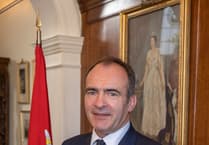The first thing Paul Beckett did when he became the Tynwald Ombudsman was to rewrite the website.
Mr Beckett, an advocate, became what is officially the new Tynwald Commissioner for Administration last week.
His appointment ushers in a number of important changes in the way in which the service will be delivered.
He says the new website provides reader-friendly answers to fundamental questions.
Indeed, it answers them in great detail and at length, including an explanation of the term ‘ombudsman’, which we learn originated in Scandinavia in the middle of the last century.
What is the Tynwald Ombudsman?
The Tynwald Ombudsman has the power to investigate a complaint by a member of the public only if a person is claiming to have sustained injustice or hardship as a result of a service failure; or in consequence of maladministration in connection with any administrative action of a listed authority.
Mr Beckett sums it up like this: ‘The role of the Tynwald Ombudsman can be summed up as seeking to encourage redress and support improvement on the part of the authorities being investigated; to persuade rather than to compel.’
What conduct can be investigated?
The Tynwald ombudsman conducts investigations into the administrative actions and any service failures of a number of public authorities.
Who can or cannot be investigated?
There is a long list of public organisations such as government departments and boards, the Manx Museum and National Trust.
Some individuals holding public office cannot be investigated: the chief minister, a government minister. a political member of a department, the Clerk of Tynwald and any officer serving in the Clerk of Tynwald’s Office.
Some institutions cannot be investigated, or can be investigated only to a limited extent.
What limitations are placed on the powers of the Tynwald Ombudsman?
There is a large number of circumstances which he won’t cover. These include international relations and contractual or other commercial transactions by government.
If the Tynwald Ombudsman, after considering a complaint, decides not to investigate, he sends a statement of the reasons for the decision to the complainant and to the listed authority in question, and also to any other person who is alleged in the complaint to have been responsible.
How is the confidentiality and secrecy which people who want to make a complaint expect assured?
Investigations are conducted in private and names are never given out without consent.
What reports does the Tynwald Ombudsman make and to whom?
The Tynwald Ombudsman records their decisions and provides details of their activity by means of a statement and reports
He also explains who has the right to complain.
Mr Beckett said: ‘An Ombudsman strengthens the principle of accountable government and weighs the conduct of faceless officials and bureaucracies. The Ombudsman bridges the gap between parliamentary political accountability on the one side and independent scrutiny by courts and tribunals on the other.’
However, he said that the resources available to the Tynwald Ombudsman were limited. At the present rate of remuneration the budget allocated for April 2023 to March 2024 is sufficient to cover up to around 300 hours per year.
‘Therefore, ahead of coming into office I have taken stock of this role completely afresh, with a view to streamlining and refining the way in which this service will be offered; to obtain the maximum benefit to the public from the time which has been allocated to the task,’ he said.
‘I am grateful to have continuing administrative support from the Clerk to Tynwald and his colleagues. I express my thanks to my immediate predecessor Angela Main Thompson OBE for a smooth handover. My first priority is to manage expectations; to ensure, to the best of my ability, that members of the public who wish to raise a complaint with the Tynwald Ombudsman will have a clear idea of who and what can be investigated and how that process begins and unfolds.’
l The website’s address is www.tynwald.org.im/ombudsman




